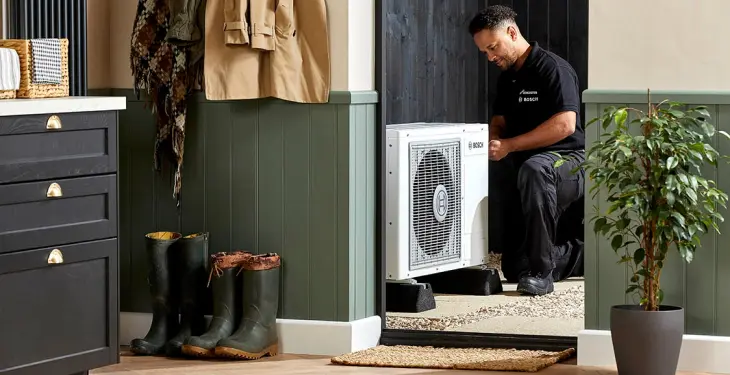

Written by Stephen Day
Gas Safe Engineer
Updated: 2nd February, 2026
Help for when your heat pump is not working properly.
Get a new boiler quote, save up to £550 per year (0% APR available).
Heat pumps are designed to run for long periods with minimal intervention, but faults can still occur.
Changes in performance are often the first sign that something is not working as it should.
A repair may be needed if heating output drops, hot water becomes unreliable, or the system behaves differently to normal.
Even small changes are worth paying attention to, especially during colder months when demand is higher.
Common signs include rooms taking longer to heat, radiators or underfloor heating not reaching temperature, or hot water running out sooner than expected.
Some homeowners notice higher electricity use alongside reduced comfort.
Visual indicators such as warning lights or on screen error messages are also important.
These usually mean the system has detected a fault that needs checking.
Problems linked to electrical safety, repeated system shutdowns, or pressure warnings should always be addressed quickly.
Continuing to run a faulty heat pump can increase wear on components and lead to more costly repairs later.
Most domestic heat pump repairs relate to a small number of recurring issues.
Understanding these issues helps set expectations before speaking to an engineer.
Poor heating performance can be linked to incorrect settings, low system pressure, blocked filters, or internal faults.
External factors such as cold weather can also highlight underlying issues that were previously unnoticed.
Some background noise is normal, especially from the outdoor unit.
However, new rattling, buzzing, or grinding sounds may point to loose components, airflow problems, or mechanical wear.
Frequent stopping and starting is known as short cycling.
This can reduce efficiency and increase strain on the system. It is often linked to sensors, controls, or system balance issues.
Modern heat pumps display fault codes when something is wrong.
These codes help identify the issue but usually require a qualified engineer to diagnose and resolve properly.
Common heat pump faults
Problem | What it may indicate | What to do next |
|---|---|---|
Poor heating | Pressure, settings, or component fault | Check controls then seek professional help |
New or loud noises | Mechanical or airflow issue | Turn system off and contact an engineer |
Frequent cycling | Control or sensor problem | Book an inspection |
Error code displayed | System fault detected | Professional diagnosis required |
In many cases, heat pump problems can be repaired without replacing the entire system.
Repairs are commonly suitable where the system is relatively new, well maintained, and the issue is limited to one component.
Air source heat pumps are designed to be serviceable, with parts that can be replaced if needed.
Replacement may be considered if the system is approaching the end of its lifespan, has recurring faults, or no longer meets the needs of the home.
Other types of heat pumps exist, but air source systems are the most widely used in UK properties.
There are a few checks homeowners can make safely before arranging a repair.
These do not involve opening the system or adjusting technical settings.
Safe homeowner checks
Check | Why it matters | When to call for help |
|---|---|---|
Thermostat settings | Incorrect settings can limit heating | If settings are correct but heating fails |
Power supply | Tripped switches can stop operation | If power continues to cut out |
Outdoor unit clear | Blocked airflow affects efficiency | If icing or shutdowns continue |
Error messages | Indicates a detected fault | If an error code appears |
If the problem continues after these checks, professional repair is recommended.
The cost of repairing a heat pump depends on the type of fault, the parts required, and the time needed to complete the work.
As a general guide, UK homeowners in 2026 may expect average repair costs to fall between £150 and £600.
More complex faults involving major components can cost more. Engineers will normally assess the issue and confirm costs before proceeding.
Regular servicing helps keep heat pumps operating efficiently and reduces the likelihood of unexpected faults.
Servicing allows early detection of wear, airflow issues, or control problems. Addressing these early can prevent breakdowns and extend system life.
A service usually involves checking filters, controls, electrical connections, pressure levels, and overall system operation. This helps ensure safe and reliable performance.
Heat pumps combine electrical, mechanical, and refrigerant systems.
Repairs should only be carried out by trained professionals to ensure safety and compliance.
Unqualified work can affect warranties and system reliability.
Using qualified engineers helps protect your home and your heating system.
iHeat installs air source heat pumps for UK homeowners and provides clear guidance on how modern systems are installed, used, and maintained.
If you are researching air source systems or want to understand how heat pumps work in practice, iHeat offers straightforward information designed to support informed decisions.
Last updated: 2nd February, 2026

Written by Stephen Day
Gas Safe Engineer at iHeat
Stephen Day is a Gas Safe registered and FGAS certified engineer with over 20 years of hands-on experience in the heating, cooling, and renewable energy industry, specialising in boiler installations, air conditioning, and heat pump systems.
LinkedInArticles by Stephen Day are reviewed by iHeat’s technical team to ensure accuracy and reliability.

27th February, 2026
Condensing boilers are considered to be some of the most efficient boilers out there on th...
 Read Article
Read Article

26th February, 2026
Vaillant boilers use a variety of parts to ensure efficient operation. This section looks...
 Read Article
Read Article

26th February, 2026
Leaving the heating on low all day might seem like a way to avoid the chill without bursti...
 Read Article
Read Article
No obligation. Takes less than 60 seconds.